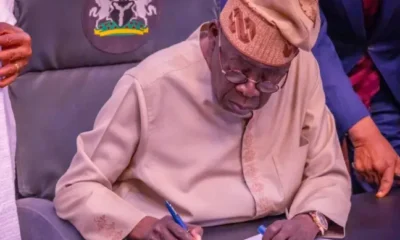Politics
Electoral Act: Nigerian lawmakers propose non-compulsory use of PVCs for voting

Members of the National Assembly are proposing an amendment to the Electoral Act to make the use of the Permanent Voter Card (PVC) non-compulsory for eligible voters during elections.
The proposal, which seeks to amend Sections 18 and 47 of the 2022 Electoral Act, says that since the Bimodal Voter Accreditation System (BVAS) does not recognise the microchip embedded in the PVC, the card should no longer be a mandatory means of identification for voting.
Contained in a draft of various amendments being considered by the legislature, the proposal instead recommends the use of the National Identification Number (NIN), Nigerian passport, or birth certificate as an acceptable means of identification for voters.
These and other proposed amendments were discussed on Monday during a public hearing organised by the Joint Committee of the National Assembly on Electoral Matters.
“The use of Permanent Voter Card (PVC) will not be compulsory, since the Bimodal Voter Accreditation System (BVAS) does not recognise the microchip in the PVC. Every registered Voter will be able to download and print their voter’s card whenever needed. This totally eradicates the issue of buying and selling PVCs, likewise all related offences. This is reflected in section 18, section 47 and the deletion of section 22.
“Acceptable means of identification for voter registration have been limited to the National Identification Number (NIN), a Nigerian birth certificate, or Nigerian passport,” the proposal reads.
BVAS and PVC Challenges
Since the introduction of BVAS into Nigeria’s electoral system, the technology has faced widespread criticism. In several elections, BVAS devices have failed to authenticate voters’ fingerprints or facial features, causing delays and frustration at polling units.
Other recurring issues include poor battery life, lack of backup power, and weak internet connectivity, especially in rural areas.
A major controversy during the 2023 general elections was the delayed transmission of results from polling units to the INEC Result Viewing Portal (IReV), which raised concerns about transparency.
Similarly, many eligible voters could not collect their PVCs due to administrative bottlenecks, long queues, and misplaced cards. Where BVAS devices failed, some voters were disenfranchised despite waiting for hours, while the late arrival of materials often led to the postponement of voting in some polling units.
Opposition parties and election observers have also alleged possible manipulation of results through BVAS or the result upload process, referencing delays in publishing results online and inconsistencies between figures recorded at polling units and those uploaded.
Push for electronic transmission of results
One of the key issues discussed at the public hearing was the electronic transmission of election results. Section 60(5) of the Electoral Act is proposed to be amended to make the electronic transmission of results mandatory.
It reads “The Presiding Officer shall transmit the results, including the total number of accredited voters, to the next level of collation both electronically and manually.”
This is another section that has generated concerns in the past in which many people advocated for and believed that if results are transmitted electronically, it would reduce the rate of manipulating election results.
Advocates of the amendment believe compulsory electronic transmission would strengthen transparency and reduce result manipulation.
Akin Akingbolu, an official of Yiaga Africa, speaking on behalf of Civil Society Organisations (CSOs) working on democracy and elections in Nigeria and across Africa, called for the inclusion of compulsory electronic voting in the ongoing amendment of the Electoral Act.
Mr Akingbolu said adopting electronic voting and mandatory electronic transmission of results would enhance the credibility of elections and ensure that every vote counts.
“Strengthening the Electoral Act to make electronic transmission of results mandatory, including the upload of polling unit level results and results sheets used at different levels of result collection. This will deepen the credibility of electoral outcomes and ensure votes count,” he said.
Jail term for collation officers
Another notable amendment is proposed under Section 71(2), which seeks to criminalise the distribution of unstamped or unsigned ballot papers and result sheets.
The provision recommends a penalty of at least one year imprisonment or a fine of N1 million, or both, for any presiding or collation officer who distributes such documents.
It states: “A presiding officer or coalition officer who distributes or causes to be distributed any ballot paper or results sheet not duly stamped and signed as required under subsection (1) of this section commits an offence liable on conviction to imprisonment for a term of not less than one year or to a fine not less than N1,000,000 or both.” the section reads.(Premium Times)
-

 News7 hours ago
News7 hours agoMajor, 3 Soldiers, Hunter Killed In Borno
-

 News7 hours ago
News7 hours agoUmrah Suffers Setback As Airlines Suspend Flights To S/Arabia
-

 Politics7 hours ago
Politics7 hours agoAtiku’s son resigns from Fintiri’s cabinet
-

 News22 hours ago
News22 hours agoJustice Tsoho To Appear Before CCB Over Alleged Non-Declaration Of Assets
-

 News7 hours ago
News7 hours agoRevised Executive Order: FG adjusts oil revenue remittance framework
-

 News7 hours ago
News7 hours agoPolice Council Confirms Disu As IG, To Be Sworn In Wednesday
-

 Politics7 hours ago
Politics7 hours agoDSS arrests social media user who ‘threatened’ Peter Obi after Edo attack
-

 World News22 hours ago
World News22 hours agoIran: Spain expels 15 US aircraft from its military bases


















